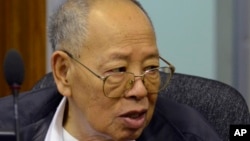PHNOM PENH and WASHINGTON - The passing of Khmer Rouge co-founder Ieng Sary Thursday means the loss of testimony at the UN-backed tribunal, and the loss of another chance for victims of the regime to see justice done, court observers said Friday. It was also a reminder that the court is facing major challenges as it seeks now to continue the trial of two other leaders, Nuon Chea and Khieu Samphan.
The court is still facing a lack of funding, and it must hold a hearing later this month to see whether Nuon Chea, the regime’s main ideologue, is healthy enough to continue a trial.
Cambodia and the international community must now “finish what they started,” said James Goldston, executive director of the Open Society Justice Initiative, a US-based group monitoring the trial.
Critics say the court may not be able to finish proceedings that have cost more than $150 million and so far successfully tried only one suspect since 2006.
The court has been slow to do its work and to keep people informed, said Long Panhavuth, a trial monitor for the Cambodia Justice Initiative. And now it is facing a dearth of funding that has many Cambodian staff upset and caused a strike by interpreters and translators.
“The death of Ieng Sary can be a push for Cambodia and the UN to improve their cooperation in raising funds and pushing the Trial Chamber to achieve a criminal verdict while two defendants are still alive,” he said.
For many observers, Ieng Sary’s death before the completion of his trial has broader implications for the court.
“The UN and the Royal Government of Cambodia did not just promise to find justice and prevent acts of genocide for the survivors of the Cambodian genocide, but for the entire human race,” said Chhang Youk, head of the Documentation Center of Cambodia. “So this promise should be attached to the obligation of allowing the tribunal to complete its work.”
Peter Maguire, a Khmer Rouge researcher and author of “Facing Death in Cambodia,” said the tribunal had become a “shining example” of wrongful thinking by the UN and the idea of “therapeutic legalism.”
“By promising to deliver unquantifiables like ‘truth,’ ‘reconciliation,’ and ‘healing,’ the [tribunal] lost sight of the primary objective of any trial—establishing guilt or innocence of the accused,” he said. “By getting mired in things like civil party participation, the court wasted precious time and money, and as a result will probably not finish the most significant war crimes trial since Nuremberg.”
The tribunal, struggling with funding and legitimacy, and under constant criticism for political interference from senior Cambodian officials, must now move forward, observers said.
“The critical challenge now it seems to me in completing this trial is to ensure that there is adequate funding so that all staff of the [tribunal] who are needed can be working full time, dedicated to fulfilling the mandate of the [court],” OSJI’s Goldston said.
It is up to the Cambodia government to ensure Cambodian staff at the court are paid, said Nushin Sarkarati, a staff attorney for the Center for Justice and Accountability. Cambodian staff say they have not been paid since December, and tribunal administration officials are currently seeking more funding from donors to provide the salaries.
“The continued failure of the government to fulfill its mandate under the ECCC Establishment Agreement has caused a dangerous disruption to the proceedings,” Sarkarati said, referring to the court by its official acronym. “The smooth operation of the tribunal is imperative for justice to be achieved. If the United Nations and the government of Cambodia want to see justice served for the victims, they must confront the financial issues of the tribunal once and for all.”
So far, donors have not pledged any new funding for the tribunal, a foreign diplomat close to the proceedings told VOA Khmer. Donors are instead pushing Cambodia to pay its share of the bill. “The international donors are more strictly adhering to this principle,” the diplomat said.
With Death of Ieng Sary, Tribunal Faces Further Jeopardy
- Sok Khemara
- Kong Sothanarith

Critics say the court may not be able to finish proceedings that have cost more than $150 million and so far successfully tried only one suspect since 2006.



